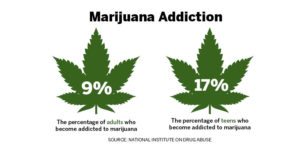Marijuana Addiction Treatment – is it Needed?

Marijuana addiction treatment unfortunately is not always taken seriously enough. While marijuana has a reputation of not being addictive, recent data shows otherwise. It is now estimated that about 30% of marijuana users will develop some level of marijuana use disorder – an estimated four million people in the United States.
A person suffering from marijuana use disorder develops a dependence because their brain adjusts to its effects and stops producing its own endocannabinoid neurotransmitters. At that point, the user can no longer stop craving marijuana even when it affects this person’s life. Up to 9% of marijuana users develop a marijuana use disorder, a number which nearly doubles if usage started in the person’s teenage years.
Oakvine Recovery Center can help. We’re well-versed in substance abuse recovery and our skilled professionals understand how to help treat a marijuana use disorder. We’ll work closely with you to create a customized treatment plan that stops your dependence on marijuana.
Has Marijuana Gotten Stronger?
The short answer is yes, marijuana has definitely gotten more powerful in recent years. In the 1990s, the average THC level of marijuana was 4%. In 2018, that number nearly quadrupled to 15%. While the long-term effects of this higher potency are still being researched, many researchers suspect that the risks of dependence and brain damage are now higher as a result.
What are the Symptoms of a Marijuana Use Disorder?
If you suspect someone might have a marijuana use disorder, these are the signs to look for:
- An increase in appetite (“the munchies”)
- Sudden weight gain
- Red, bloodshot eyes
- Dry mouth
- Impaired judgment and coordination
- Anxiety, nervousness, or paranoia
- Unmotivated behavior
- Slower reaction times than normal
- Loss of short-term memory
- Increased sleepiness or abnormally relaxed state
What are the Long-Term Effects of Marijuana Abuse?
The CDC has done studies on the long term effects of marijuana. Marijuana use disorder may have a number of long-term negative impacts on a user’s brain. Multiple studies suggest this to be the case, though we will note that there are conflicting reports.
Animal studies suggest that the most commonly suspected effect of marijuana – memory loss – has a lot of basis in reality. The hippocampus, the part of the brain that forms memories, has high level of cannabinoid receptors. The THC in marijuana changes how the hippocampus processes information, which can affect memory and cause functional changes to the hippocampus after prolonged usage, especially when marijuana use occurs during adolescence.
There is also evidence of the debated “gateway drug” effect from marijuana use disorder. Other studies have suggested that marijuana use disorder can permanently impair learning, impulse control, and cognitive abilities, as well as lead to a decline in IQ.
A marijuana use disorder may also have serious effects on the lungs and throat. Some suspected problems include risk of cancer and lung disease similar to smoking tobacco, including lung hyperinflation, large airway inflammation, chronic bronchitis, and higher likelihood of respiratory infections.
Finally, some studies suggest that high marijuana usage can lead to anxiety, depression, and schizophrenia, especially among those with pre-existing risks of these conditions.
How do you Treat a Marijuana Use Disorder?
At Oakvine Recovery Center, we believe that every patient is unique and will benefit from following a customized approach to recovery. We will work to understand the personal context of your marijuana use disorder and then implement some of the following:
- Cognitive behavior therapy. Do you know all of the reasons for using marijuana—the triggers, the situations? We can help you identify them and understand how to address them.
- Contingency management. We create a reward system in which the patient receives tangible positive rewards for avoiding marijuana and has them taken away when usage occurs.
- Group therapy. It can make a huge difference to discuss your marijuana use disorder with others having the same experience.
- Family therapy. Many patients who are addicted to marijuana have let it affect their family life and relationships. Oakvine can help bring you back closer together.
Let’s Get Started
Marijuana use disorder can go for years before someone realizes it’s time to seek help. Don’t wait; we can help you stay clean and return to your most functional self.
Contact us here or call 1-888-973-7779 to get started!



